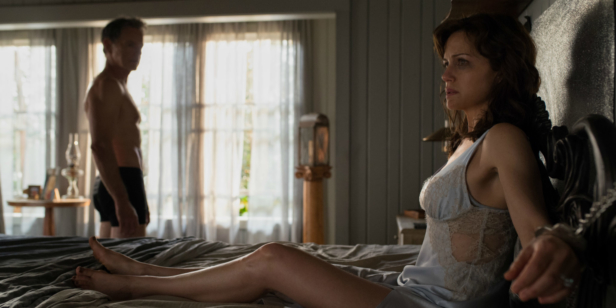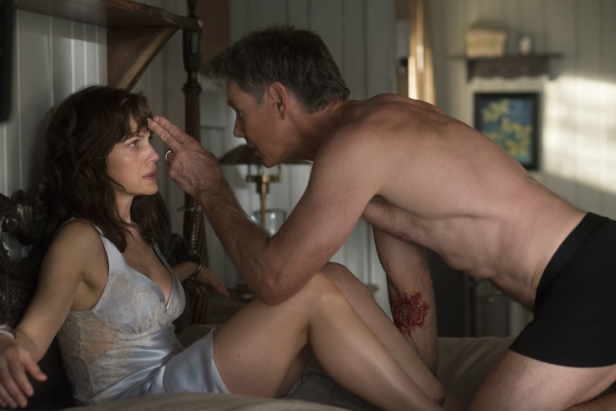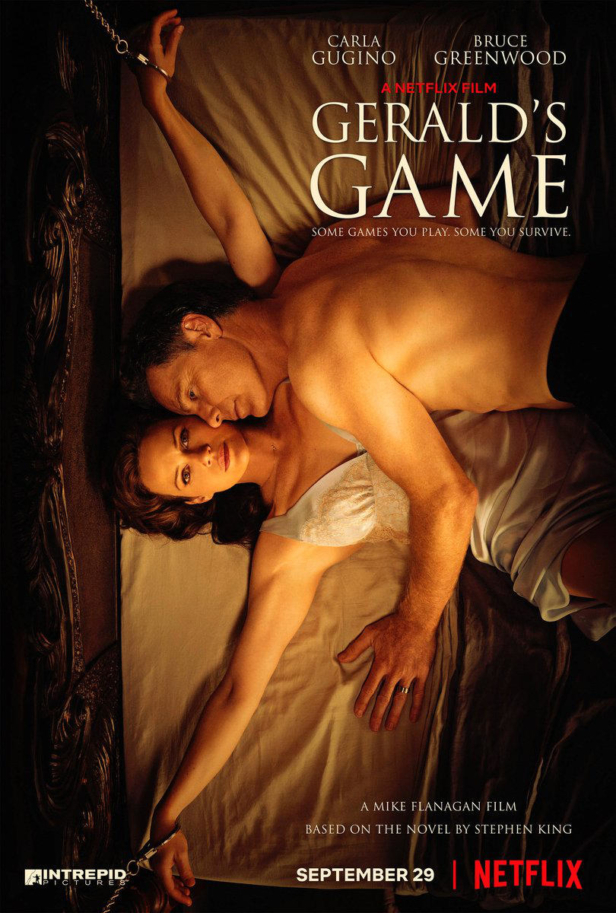Director Mike Flanagan and producer Trevor Macy have worked together on several projects in the past – including Oculus, Hush, Before I Wake, and Ouija: Origin Of Evil – but Gerald’s Game might be their most ambitious and challenging yet. It’s an adaptation of a Stephen King novel, in which a woman fights for survival after her husband dies and leaves her handcuffed to their bed in a remote lakeside cottage.
Turning King’s story of regret and redemption into a movie was a real labour of love for the pair, and since it hits Netflix this week, SciFiNow caught up with Flanagan and Macy to find out how they coped with a supposedly unfilmable book, a legendarily picky author, and two pairs of extremely uncomfortable handcuffs…
What was it about Gerald’s Game that made you want to adapt it?
Mike Flanagan: I’ve always been a Stephen King fanatic since I was a kid, and I read the book in college. When I put the book down, I had gooseflesh all over my arms. And I had two thoughts at the same time: I thought it was brilliant, and it was unfilmable.
It took me half my life to figure out how to film it, but I thought it was an incredibly powerful story of empowerment, and one of the most intense dives into the psyche of the protagonist that I’d ever seen on the page. It was an incredible challenge, but a story I also loved.
There are two obvious challenges about adapting it: one is that the story takes place mostly inside Jessie’s head, and the other is that it’s all set in one room. How did you deal with those problems?
Mike Flanagan: It took me a couple of years to come up with this mechanism of taking her inner monologue and putting it out there into the room. To make it all work, we really had to rely on our actors to carry us through the movie, and on the camera to keep it dynamic. Even though it was all in one room!
For that, we just exhaustively shot-listed. We never wanted to be in the same angle twice if we could help it.
Casting must have been vital, too. Was it hard to find the right lead actress?
Mike Flanagan: It was really hard! We felt in the beginning that this part would either scare an actor away or be irresistible and that whoever stepped into it could potentially do career-best work, which I think Carla [Gugino] does.
Trevor Macy: She was also an amazing human being, and motivated the crew during a difficult and harrowing shoot. You never have enough time or money to make the movie you want to make; that’s true at any budget level, and it was certainly true here! We had 23 days to shoot this movie, which is not long. And she spends a lot of time in handcuffs – if you have a 4K camera, you can’t fake those handcuffs, and they’re painful. Mike put himself in them, and… how long did you make it?
Mike Flanagan: Less than five minutes! I told her I wouldn’t ask her to do anything I wasn’t willing to do myself, but I couldn’t keep my arms up in those things. They hurt so much.
Speaking of pain, there’s one moment of extreme gore in the movie that’s extremely difficult to watch. How did you approach that?
Mike Flanagan: My DP couldn’t look at the monitor when we filmed that – I still don’t think he’s seen that scene, I know he didn’t look at it when we did the colour! I could barely look at it.
But it was one of those moments in the book that was so visceral that I knew we had to do it pretty much the way it is in the book. When I read it, I shut the book at that point and set it aside, and I wanted people to have that same kind of reflexive reaction to the movie. I love watching people watch that scene.
How involved was Stephen King in the production?
Trevor Macy: He’s a great steward of his own adaptations, and I mean that contractually but also creatively. Sending him a script is nerve-wracking, because he can just say no and you’re finished.
But he was supportive. We made choices that creatively diverged a bit from the book, in terms of how to make the internal monologue external, and he was always supportive of that choice. We included him whenever he wanted to be included, and it was a great experience.
It must have felt good when he liked the movie, then?
Mike Flanagan: I’m not kidding, I printed out the email he sent me after he watched the movie, and I framed it and hung it in my living room.
Andy Muschietti’s adaptation of IT has just been a huge success. What do you think it is about King’s stories that means they still resonate with audiences?
Mike Flanagan: I think King writes characters very, very well. What a lot of people don’t realise is that his stories can be so disturbing and so horrific because you care so much about the people and the scares come organically out of those characters.
I think people think of him as a horror writer and they forget that he wrote The Body, which became the movie Stand By Me, and Misery, and Shawshank Redemption. He writes human beings really well, and there’s something about that that’s always going to resonate.
Now you’ve made Gerald’s Game, are there any other dream projects on your wishlist?
Mike Flanagan: I have a pile of Stephen King stuff I’d like to do! I’d love to do Lisey’s Story, and Doctor Sleep, and for a while I really wanted to re-do Pet Sematary, because that book terrifies me like none of his other books. I’d also love to adapt Richard Matheson, like Hell House or I Am Legend.
Gerald’s Game launches on Netflix on Friday 29th September.


